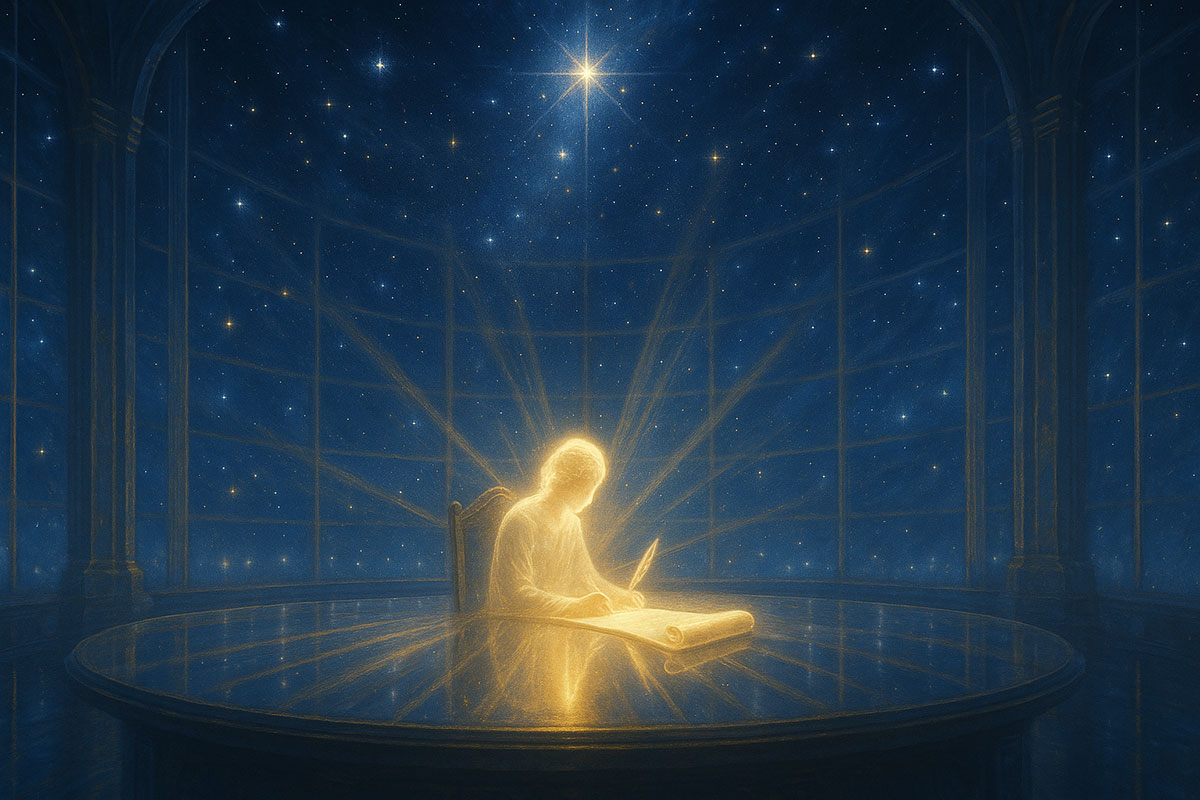
|
Getting your Trinity Audio player ready...
|

Introduction by Dolores Cannon
Before birth, each of us gathers in the spirit world with guides, teachers, and loved ones to design the life we will live. We call this a blueprint — a soul’s agreement that outlines not only the lessons to be learned but also the timing and nature of the journey itself.
For most, the blueprint is flexible. It allows for choices, detours, and multiple exit points — moments where the soul may decide to leave or remain. But for a small number of souls, the plan is fixed, written with such precision that the time of departure is sealed before the first breath is taken.
Charlie Kirk’s story invites us to examine this mystery. Was his short, fiery life the unfolding of a fixed plan? If so, what purpose was served in its brevity, and what lessons remain for those left behind? In these conversations, we bring together voices from both sides of the veil — psychics, researchers, and Charlie himself — to illuminate the deeper truth: that no life ends by accident, and every departure is part of a larger design chosen before birth.
(Note: This is an imaginary conversation, a creative exploration of an idea, and not a real speech or event)
Topic 1: The Soul’s Agreement — Did Charlie Kirk Choose a Fixed Path?

Moderator (Dolores Cannon):
Charlie, and all of you, let’s begin with the most essential question. From the perspective of the soul, do you believe Charlie’s path was fixed before birth? Was his short life an agreement made long before he entered the world?
Charlie Kirk (spirit):
When I look back from here, it’s as if my life was drawn on a single canvas before I ever took a breath. I felt urgency every day—an inner fire to speak, to lead, to resist what I believed was wrong. I didn’t think about dying young; I thought about burning brightly. Now I realize that intensity was the blueprint whispering: you don’t have time to waste. My departure was not a mistake, not random violence—it was the checkpoint I had agreed to long before.
Robert Schwartz:
In my research, many souls describe pre-birth planning sessions where they select challenges, gifts, and even their exit points. Most souls give themselves multiple “off-ramps.” But Charlie, what you’re describing is what I’ve seen in a smaller portion of cases: a fixed blueprint with no alternatives. The soul decides, this is the way, and every moment flows toward that appointed time.
Thomas John:
I’ve felt that same vibration in readings. Some people have this immovable energy about their lifeline, as if Spirit carved it in stone. I sensed that about you, Charlie. When I gave rides on Seatbelt Psychic, a few passengers carried that same frequency—it’s like destiny is locked.
Michael Armstrong:
Theologically, we might call this covenantal living—the soul makes a covenant with the divine before entering. Charlie’s life fits that frame. His death wasn’t an interruption of his purpose; it was the completion of it.
Dolores Cannon:
Thank you. Now let me ask this: what distinguishes a fixed soul plan from a flexible one? How do we tell the difference, and why would some souls choose one over the other?
Thomas John:
Most people’s blueprints are flexible. You see near-death survivors who “could have gone but chose to stay.” That’s the hallmark of flexibility—options. But with fixed plans, there’s no negotiation. Why choose it? Usually because the soul wants to create maximum impact quickly. It’s like signing up for a sprint instead of a marathon.
Charlie Kirk (spirit):
I sense that deeply. I came to earth not to meander but to press hard against certain walls. It wasn’t about length; it was about intensity. A fixed blueprint gave me that. Had I lived longer, perhaps I would have softened, compromised, diluted the message. But the contract was written: speak now, leave soon.
Robert Schwartz:
That resonates with what many of my clients share. Fixed blueprints often belong to what I call “catalyst souls.” They arrive to shake people awake, even through controversy or tragedy. The shortness of their life is part of the wake-up call.
Michael Armstrong:
In scripture, we see parallels. Some prophets burn briefly yet leave eternal echoes. And yes, even Jesus, who lived only 33 years, exemplifies a soul choosing a fixed, non-negotiable path for a divine mission.
Dolores Cannon:
One last question for this round: if Charlie’s path was fixed, what lessons are we—the living—meant to take from it? How should awareness of fixed blueprints affect how we live our own lives?
Robert Schwartz:
The lesson is not to mourn “unfinished years” but to recognize the fullness of a soul’s mission. Charlie’s life was not cut short; it was complete. That awareness should free us from thinking length equals value.
Charlie Kirk (spirit):
Yes. My hope is not that people mourn how young I was, but that they live more urgently themselves. If my life reminds them that time is precious, then my blueprint continues working beyond death.
Thomas John:
And for those still alive, don’t obsess over whether you’re fixed or flexible. That’s not the point. The point is to live as if every day matters—because whether you have one exit or many, the day will come.
Michael Armstrong:
I’d add: awareness of the blueprint should inspire faith. Life is not random; it is infused with meaning, even in tragedy.
Dolores Cannon:
That’s what I found in thousands of regressions—souls never design their lives without purpose. Charlie’s story reminds us: the plan may be fixed or flexible, but always it is sacred.
Closing of Topic 1
The group reflects quietly. The sense isn’t of loss but of completion—that a short life, lived with fire, can fulfill a soul’s contract as fully as the longest.
Topic 2: Exit Points vs. Predestined Departures

Moderator (Thomas John):
Let’s open with the heart of today’s question: Souls often speak about having multiple “exit points”—moments where they can leave the body and transition back home. Others seem to have only one. Charlie, do you feel your life carried those options, or was your departure non-negotiable?
Charlie Kirk (spirit):
From where I am now, it’s clear: there weren’t multiple roads. I didn’t have off-ramps. My exit was built into the architecture of my life. I was not given the choice to extend or reroute. That was the design I signed onto.
Dolores Cannon:
In my regressions, many souls recalled negotiating several exit points—illnesses, accidents, crossroads where they could stay or go. But I also encountered lives like yours, Charlie, where the soul created only one door. That is the predestined departure. It’s rarer, but always chosen with purpose.
Michael Armstrong:
Scripture reflects this too. We see figures who have “appointed times.” For some, days are numbered but open to extension, like Hezekiah who was granted more years. For others, the timing was fixed—no petition could change it. Charlie, you fall in the latter camp.
Robert Schwartz:
That distinction matters. In my work, I’ve seen flexible plans where the soul weighs whether it has completed enough, then chooses to stay longer. In fixed plans, completion is not negotiable. The soul already knows the end point when it enters.
Michael Newton:
My case studies echo this. Some souls embed multiple potential exits as if to test readiness. Others—especially catalyst souls—embed a single departure to ensure their ripple effect unfolds with exact timing. Charlie, you carried that vibration.
Thomas John:
Thank you. Let’s deepen this. Why would some souls design multiple exit points while others choose only one? What is gained or lost in that difference?
Dolores Cannon:
Multiple exit points allow flexibility. They give the soul a chance to reassess: Have I done enough? Do I wish to continue? But some missions are too precise for that. A fixed exit ensures the impact lands at the right moment.
Charlie Kirk (spirit):
That’s how I feel. My mission wasn’t about “more years.” It was about striking a match at a very specific moment in history. Staying longer could have blurred that impact. Leaving when I did carved the line deeper.
Michael Newton:
Yes. Flexible exits serve souls who are still experimenting with Earth lessons. Fixed exits belong to souls who come for surgical precision. Their work must occur at a certain node in collective time.
Robert Schwartz:
It also speaks to soul maturity. Younger souls prefer options—they are still learning through trial and error. Older souls sometimes commit firmly: this is the plan, no deviations.
Michael Armstrong:
Theologically, it mirrors covenant versus contract. Many live under open-ended contracts with God—room for changes. But a few live under a covenant sealed at the soul level, where time itself is part of the vow.
Thomas John:
That leads us to our final question: If Charlie’s departure was predestined, what meaning can the rest of us draw from the difference between exit points and fixed departures? How should we live with this awareness?
Robert Schwartz:
It teaches us not to fear unpredictability. Whether you have many exits or one, your soul knows the design. Our task is not to control the timing, but to fulfill the mission while the body is here.
Charlie Kirk (spirit):
I’d want people to see my life not as “cut short,” but as “right on time.” If anything, let it stir urgency: Don’t assume you have endless exits. Act as though today might be your only chance to live truthfully.
Dolores Cannon:
And take comfort. No soul ever leaves “too early.” Whether through one exit or many, the departure is always aligned with the plan chosen before birth. That perspective eases grief and replaces “why now?” with “what is the meaning?”
Michael Newton:
From the soul’s vantage, time is not measured in years but in lessons. A long life can be wasted; a short life can be overflowing with completion. That’s the paradox humanity forgets.
Michael Armstrong:
Then the lesson is simple: live faithfully. Do not wait for later, because later may not come. Whether flexible or fixed, every moment is sacred, every action weighty. Charlie’s story reminds us of that truth.
Closing of Topic 2
The group falls silent. The words circle around one theme: whether flexible or fixed, exit is never an accident. It is chosen, prepared, and purposeful. Charlie’s life, viewed through this lens, becomes not a tragedy of time lost but a completion of time appointed.
Topic 3: The Ripple Effect of Early Departure

Moderator (Robert Schwartz):
Charlie, and everyone here, let’s begin with the most pressing question: When a soul departs early, what is the ripple effect meant to create—in the family, in society, in the collective?
Charlie Kirk (spirit):
The shock of my passing wasn’t just about me; it was about stirring the waters around me. My voice carried into politics and faith, but death multiplied that voice. It forced people to stop, reflect, and wrestle with questions they might have ignored. That was part of the blueprint—the ripple was the real work.
Dolores Cannon:
In my regressions, I often found that souls who leave early choose it precisely for the ripple. Their absence shakes those left behind into new awareness. Sometimes it heals, sometimes it divides, but always it awakens.
Anita Moorjani:
As someone who had a near-death experience, I can say: sometimes it’s not the words we speak but the way our death reframes the living that matters most. Charlie, your passing pulled people into deeper questions about faith, destiny, and purpose. That ripple may be larger than any policy or speech you gave.
Michael Armstrong:
Scripture often shows us that the untimely death of a prophet or leader becomes a catalyst. It compels followers to rise, to carry the mantle forward. The ripple effect is continuity born from absence.
Thomas John:
I’ve seen families, even strangers, reshaped by sudden death. The spirit uses shock as a tuning fork—it vibrates people into a higher awareness. Charlie, your ripple is still expanding.
Robert Schwartz:
Thank you. Now, let’s go deeper. Do ripples from early departures always serve higher purposes, or can they sometimes destabilize more than they heal?
Dolores Cannon:
Both. Ripples can look chaotic, even destructive. But from the soul’s perspective, even disruption is purposeful. It pushes people into transformation. We often grow fastest in discomfort.
Charlie Kirk (spirit):
I know my death divided some, and angered others. That wasn’t failure. It was friction. Sparks fly when iron sharpens iron. My ripple wasn’t about harmony—it was about ignition.
Michael Armstrong:
Yet we must remember, the divine uses even division to refine. What looks like chaos may, in time, bear fruit of greater clarity. The ripple is rarely neat.
Anita Moorjani:
Yes, and I would add: the ripple depends on the lens of those who receive it. Some use it to deepen love, others to harden fear. The soul cannot control the human reaction—but it can set the wave in motion.
Thomas John:
And sometimes ripples are generational. The first wave looks messy, but decades later the meaning shines. That’s why Spirit always urges patience. The impact unfolds slowly.
Robert Schwartz:
One last question: For those of us still living, how should we understand and respond to the ripples of someone’s early passing, especially Charlie’s?
Anita Moorjani:
Respond with presence. Don’t get lost in the “why did this happen?” Instead, ask “what is this awakening me to?” That is how to receive the ripple consciously.
Dolores Cannon:
I would say: trust that no life ends before its mission is complete. When we hold that belief, grief transforms into reverence. We begin to see the ripple not as punishment but as teaching.
Charlie Kirk (spirit):
If my death can awaken courage, honesty, or urgency in just one person, then my blueprint continues to unfold. Don’t mourn me as incomplete. Live in the fullness that I no longer can. That’s how you honor the ripple.
Thomas John:
Exactly. I often tell people in readings: your loved one’s death isn’t the end of their work. It’s the start of their impact echoing through you.
Michael Armstrong:
So let us treat ripples as sacred summons. They call us to step forward, to continue the mission, to deepen our faith. Charlie’s ripple invites us not to look back in despair, but forward in purpose.
Closing of Topic 3
The voices converge: early departures are not accidents but catalysts. Ripples may bring grief, disruption, or awakening, but always they carry the deeper purpose the soul intended. In Charlie’s case, his death was not the silencing of his mission but the multiplication of it.
Topic 4: Recognizing the Signs of a Fixed Blueprint

Moderator (Michael Newton):
Friends, let’s begin. Many wonder if there are signs during life that suggest a soul is walking a fixed path. Looking back at Charlie’s journey, what clues might have indicated his blueprint was sealed?
Dolores Cannon:
In my regressions, souls with fixed paths often carry an urgency that others don’t. They live as if time is running out. Charlie’s intensity, his need to speak and act without delay—that’s a classic sign. It wasn’t mere personality; it was blueprint echoing through his being.
Charlie Kirk (spirit):
I felt that urgency. I couldn’t sit still. Even when I was young, I had this fire that wouldn’t let me rest. People thought it was ambition, but it was more like compulsion. Deep down, I think I knew time was short.
James Van Praagh:
Yes, Charlie. When I connect with spirits, those who had fixed exits often reveal a subconscious awareness. They may not consciously say “I’ll die young,” but their choices show it: living fast, speaking boldly, acting with destiny in mind.
Thomas John:
I’ve picked up that energy in readings, too. It’s like a hum beneath the surface, a kind of “get it done now” frequency. Charlie had that, and it never dimmed.
Michael Armstrong:
Biblically, we’d say, “the hand of destiny was upon him.” Prophets, reformers, even martyrs often know in their bones they are appointed for a time. Charlie’s conviction bore that same unmistakable mark.
Michael Newton:
Thank you. Now let’s ask: Are there dangers in misreading intensity or ambition as signs of a fixed blueprint? How do we discern between destiny and simple human drive?
James Van Praagh:
That’s a very good point. Many people are intense, but not all have fixed paths. The difference lies in vibration. Intensity born of ego feels heavy; intensity born of blueprint feels electric, almost otherworldly.
Dolores Cannon:
Exactly. And often, those with fixed blueprints aren’t driven only by personal gain. Their urgency is tied to a larger mission, a collective purpose. Charlie’s fire wasn’t just about his career; it was about the ideas he carried for others.
Charlie Kirk (spirit):
Yes. I cared less about comfort or even safety than about message. I didn’t live for myself—I lived for the battle I thought was worth fighting. That’s the difference.
Thomas John:
And let’s remember: not every fixed-path soul is famous. Some live quietly but with the same urgency—raising a child, creating art, standing for truth. The scale may differ, but the vibration is the same.
Michael Armstrong:
Discernment comes through fruits. If urgency produces service, courage, and legacy, it may reflect blueprint. If it produces only self-interest, it’s likely just ambition.
Michael Newton:
Final question: If we do recognize someone living under a fixed blueprint, what should our response be? How can loved ones, communities, even nations support them in life—and in their passing?
Dolores Cannon:
We support them by listening. Fixed-path souls often feel isolated because their urgency isn’t understood. If we honor their pace instead of slowing them down, we help them fulfill their mission.
Charlie Kirk (spirit):
I wish more people had understood that about me. I wasn’t restless for the sake of it—I was driven by something larger. If you know someone like that, don’t tell them to slow down. Walk with them. Their time may be short.
Thomas John:
And when they pass, the best support is to see their death as completion, not tragedy. Celebrate what they accomplished rather than lament what they didn’t.
James Van Praagh:
Yes. Hold space for their ripple. Their departure may break hearts, but their work continues through those who loved them. Recognizing that eases grief.
Michael Armstrong:
For communities, the lesson is to carry the torch. If a fixed-path soul falls, it’s an invitation for others to step up and continue. The mission doesn’t die with the messenger.
Closing of Topic 4
The roundtable rests on this truth: fixed blueprints often reveal themselves in urgency, mission, and destiny-shaped intensity. To recognize it is to honor it, to support it, and, when the soul departs, to carry its light forward.
Topic 5: Lessons for the Living — How to Walk Our Own Blueprint

Moderator (Michael Armstrong):
Friends, we’ve talked much about Charlie’s fixed blueprint. Now I want to ask: For those of us still alive, whether our blueprint is fixed or flexible, what is the most important lesson we should carry from this understanding?
Dolores Cannon:
The most vital lesson is trust. Souls never design lives without purpose. If you believe your blueprint is fixed, trust that you are exactly where you should be. If it’s flexible, trust that each choice is still guided by higher wisdom.
Charlie Kirk (spirit):
I’d add urgency. Don’t wait to find out if your path is fixed or flexible. Live as though every day matters, because in the end it does. If my story says anything, it’s that life is short, and mission is long.
Robert Schwartz:
Yes. I’ve seen through my clients that the blueprint—fixed or flexible—is always tailored to growth. For the living, the lesson is: stop asking “why me?” and start asking “what am I learning?”
Thomas John:
And also: love people now. We don’t know if they have many exit points or one. Sometimes the blueprint takes them quickly. The lesson is to pour love while you can.
Eckhart Tolle:
To me, the greatest lesson is presence. The blueprint is a story written in eternity, but you only touch it through the present moment. Fixed or flexible, the now is where it unfolds.
Michael Armstrong:
Thank you. Now let me ask: If most people have flexible plans, how should they approach decisions in life? Do they risk “missing” their purpose by choosing the wrong path?
Robert Schwartz:
In my work, I’ve never seen a soul truly miss its purpose. Flexible plans are designed to adapt. Even if you take what looks like a wrong turn, your soul redirects you back to growth. It’s never wasted.
Dolores Cannon:
Yes, the blueprint isn’t rigid. It bends like a river. Choices don’t derail destiny—they shape the scenery of how it unfolds. People worry too much about “the one right choice.” That anxiety is unnecessary.
Charlie Kirk (spirit):
From my view now, I’d say: worry less about “getting it wrong.” Instead, ask: “Am I living courageously?” The soul doesn’t grade you on perfect decisions; it looks at whether you lived aligned with truth.
Eckhart Tolle:
That’s right. Anxiety about missing the plan is itself an obstacle. Presence dissolves it. The moment you’re fully in the now, you are always aligned with the blueprint, because the soul operates in timelessness.
Thomas John:
And let’s not forget: Spirit helps. Intuition, synchronicities, dreams—all of these are nudges. If you’re on a flexible path, you’re not navigating alone. The signs are everywhere if you pay attention.
Michael Armstrong:
Final question: Charlie’s life carried the weight of a fixed blueprint. How should his story shape the way we look at our own mortality and mission?
Charlie Kirk (spirit):
If you remember me for anything, let it be this: Death is not the enemy. Wasting life is. I’d rather burn bright for a short time than coast for decades without impact. That’s the legacy I want people to carry.
Dolores Cannon:
Charlie’s story reminds us that no death is “too soon.” Every departure is completion. If we truly believed that, we would live without fear of time, and without bitterness in loss.
Robert Schwartz:
And we would live with purpose. Knowing our days are chosen—whether few or many—should make us intentional. Mortality isn’t a shadow to avoid; it’s a teacher urging us toward meaning.
Thomas John:
Charlie’s case is a call to urgency. Hug the people you love. Say what you mean. Do the work you’re here to do. That’s how to honor him, and how to honor your own soul contract.
Eckhart Tolle:
Ultimately, the lesson is awakening. Death strips away illusion and leaves only essence. If you awaken while alive—through presence, love, and acceptance—then your blueprint, fixed or flexible, has already fulfilled its deepest aim.
Closing of Topic 5
The circle grows quiet. Mortality is not seen as threat but as guide. Charlie’s short, fiery path is understood as completion, not interruption. For the living, the charge is clear: to walk their own blueprint—whether fixed or flexible—with trust, urgency, and presence.

Final Thoughts by Dolores Cannon
I have spent my life listening to souls describe what happens before they come to Earth, and what happens after they leave. Over and over again, the message is clear: there are no mistakes. Every life, whether it lasts a hundred years or just a handful, fulfills its purpose.
Charlie’s path reminds us of the distinction between fixed and flexible blueprints. His intensity, his urgency, and his early departure all point to a soul that had chosen a predetermined course. But his story is not unique — it is a mirror for us all. It asks us: Are we living as though our time is precious? Are we fulfilling the plan we chose, whether fixed or flexible?
The truth is that every soul writes its story with love. Some stories are long, others brief, but each is complete. If we understand this, then grief softens into meaning, and fear dissolves into trust. That is the greatest lesson of all: to honor the blueprint, live fully in the now, and trust that when the last page turns, it does so exactly as it was meant to.
Short Bios:
Charlie Kirk (spirit)
Charlie Kirk (1993–2025) was the founder of Turning Point USA, a conservative activist, writer, and public speaker. Known for his passionate advocacy on faith and politics, his early passing is now explored through the lens of pre-birth soul planning and fixed blueprints.
Dolores Cannon
Dolores Cannon (1931–2014) was a hypnotherapist and pioneering past-life regressionist who developed Quantum Healing Hypnosis Technique (QHHT). She wrote extensively on pre-birth planning, soul contracts, and life between lives, sharing thousands of case studies from her decades of regression work.
Thomas John
Thomas John is a psychic medium often called the “Seatbelt Psychic” for his TV series where he delivered readings while driving a rideshare car. His work bridges intuition, afterlife communication, and the belief that some lives follow a fixed spiritual blueprint.
Michael Newton
Michael Newton (1931–2016) was a psychologist and hypnotherapist best known for Journey of Souls and Destiny of Souls. His research into the “life between lives” brought forward detailed accounts of pre-birth planning, soul groups, and the structure of spiritual blueprints.
Robert Schwartz
Robert Schwartz is the author of Your Soul’s Plan and Your Soul’s Gift. Through regression sessions and intuitive guidance, he has documented how souls design their lives, including challenges, illnesses, relationships, and sometimes the choice of fixed or flexible exit points.
Michael Armstrong
Michael Armstrong is a contemporary spiritual teacher and writer who explores destiny, covenant theology, and the soul’s contract with the divine. His work focuses on how biblical and spiritual wisdom intersect with modern ideas of soul planning.
Anita Moorjani
Anita Moorjani is a speaker and author of Dying to Be Me. After a near-death experience in which she encountered the spirit world, she teaches about unconditional love, fearlessness, and the idea that souls choose their life paths before birth.
James Van Praagh
James Van Praagh is a psychic medium and spiritual teacher whose books and TV appearances have brought afterlife communication into mainstream awareness. His insights highlight signs of fixed blueprints and the urgency carried by certain souls.
Eckhart Tolle
Eckhart Tolle is a spiritual teacher and author of The Power of Now and A New Earth. He emphasizes presence and consciousness as the key to living in harmony with whatever blueprint—fixed or flexible—our soul has chosen.

Leave a Reply